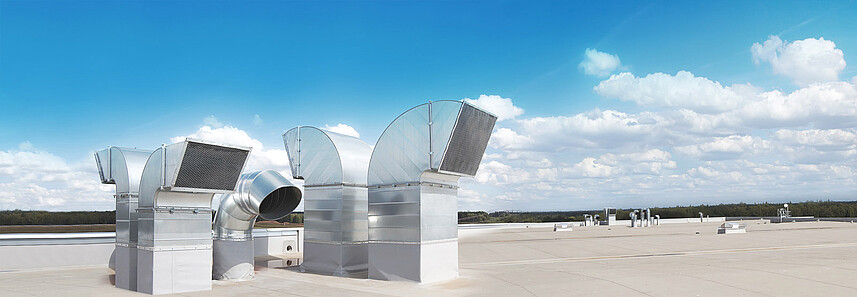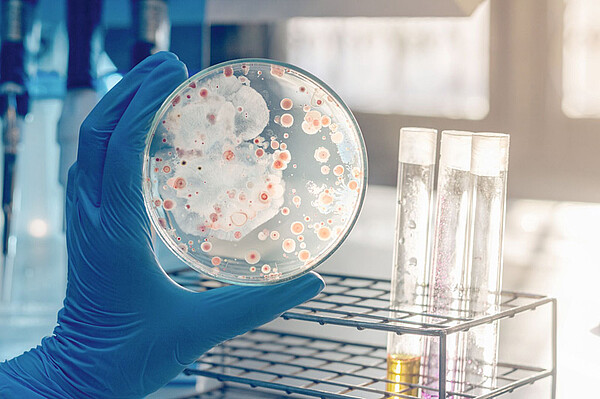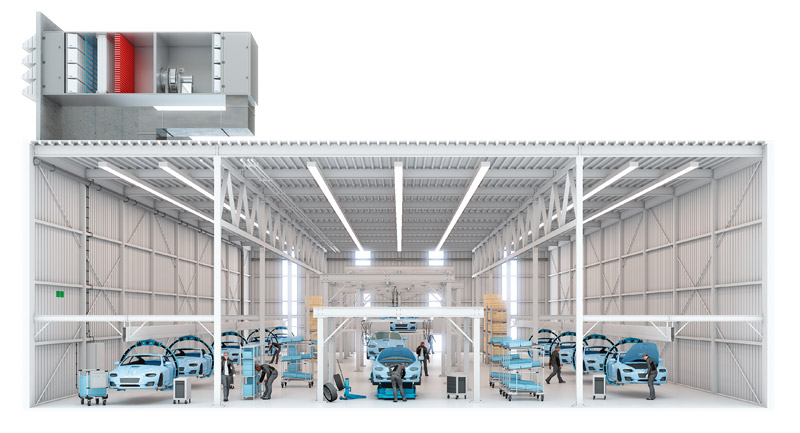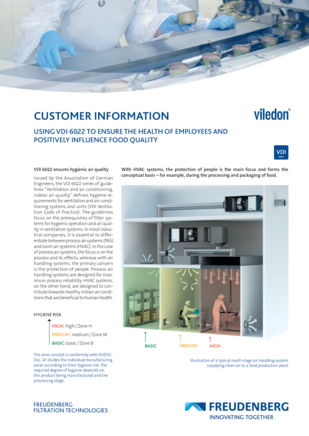VDI 6022 hygiene requirements for ventilation and air-conditioning systems and devices
Indoor air handling systems (HVAC systems) have an influence on the air quality in indoor spaces. Shortcomings in the systems pose health risks. The VDI 6022 test criteria therefore define measures to ensure perfect hygiene in air handling systems in accordance with the current state of the art. In order to comply with the hygiene standards according to VDI 6022, regular inspections, maintenance and cleaning work must be carried out.
Contents
1. What are the objectives of VDI 6022?
2. Who is affected by hygiene inspections of air handling units according to VDI 6022?
3. What are the risks associated with improperly operated air handling systems?
4. What are the advantages of VDI 6022?
5. What is the hygiene inspection procedure required by VDI 6022?
6. VDI 6022 in surface technology
7. VDI 6022 for safe food production
8. Your contact for hygiene inspections in accordance with VDI 6022
What are the objectives of VDI 6022?
We spend a large part of our time indoors. For indoor air that is beneficial to health, the supply air quality from air handling systems and devices plays a decisive role. The aim of the guideline VDI 6022 hygiene requirements for ventilation and air-conditioning systems and devices is to achieve an air quality that is beneficial to health. During the operation of air handling systems, care must be taken to keep the pollutant load from organic and inorganic substances as low as possible. VDI 6022 provides specific guidelines for the planning, implementation, maintenance and servicing of air handling systems. Hygiene is the top priority in this context.

Who is affected by hygiene inspections of air handling units according to VDI 6022?
Whether in the office or in industrial real estate – the hygiene requirements for HVAC systems and devices according to VDI 6022 must be observed for all systems that supply occupied rooms indoors with supply air. The responsibility for carrying out hygiene inspections in accordance with VDI 6022 lies with the operator of the air handling unit. The trade supervisory offices and the offices for occupational health and safety check whether the systems meet the requirements of VDI 6022.
What are the risks associated with improperly operated air handling systems?
HVAC systems ensure a healthy indoor climate by removing fine dust, germs and pollen from the air. They also regulate the temperature and achieve optimal humidification. However, if they are not adequately maintained, they can have the opposite effect and harm our health. Irregular filter changes, a humid environment and high temperatures favor the growth of molds or bacteria. These germs can cause serious respiratory illnesses. However, contamination is not only problematic for the human organism. In the plant itself, clogged filters and debris can also affect airflow. As a result, the plant has to increase its output, which causes energy consumption to rise.
What are the advantages of VDI 6022?
An optimally operated HVAC system provides breathing air that is low in pollutants and has a sufficient concentration of oxygen. However, increasing contamination of the system is almost impossible to avoid due to its constant operation. Hygiene inspections according to VDI 6022 ensure safe functioning of the plant and at the same time a healthy and hygienic working environment. In this way, the guideline helps to protect people and avoid liability risks. In addition, the application of VDI 6022 can ensure efficient energy consumption.
What is the hygiene inspection procedure required by VDI 6022?
Even the design of air handling units has an influence on hygiene. Intelligent design reduces the amount of cleaning required. Easily accessible components facilitate maintenance. Hygiene inspection includes a visual inspection of all components of the air handling system to identify the extent of contamination. However, visual inspection is not sufficient to assess the condition of the system. Microbiological testing therefore plays a more important role.

This is done with the aid of swab samples and airborne germ measurements, because germs that are hazardous to health cannot be detected in a purely visual inspection. At the end of the hygiene inspection in accordance with VDI 6022, a report is prepared that provides an ideal basis for decision-making. If the hygiene inspection has revealed any deficiencies, action is required. If no components are damaged, cleaning is usually sufficient. After that, the plant is disinfected. If necessary, a technical maintenance is carried out and defective components replaced.
VDI 6022 in surface technology
VDI 6022 also plays an important role in surface technology to ensure optimum protection for both people and machines. Air filtration must be optimized in terms of health, for example to protect employees from pollutants and microorganisms during the pre- and final assembly of vehicle parts. At the same time, air filtration must be adapted to process requirements. A customized filter concept increases the energy efficiency of the systems and reduces operating costs.

VDI 6022 for the safe production of food
The requirements for air quality during food production are high. For this reason, VDI 6022 is also relevant in this area to comply with high hygiene standards and maintain high-quality products. To protect consumers, it is important to avoid contamination of the products by dust or microorganisms.
Hygiene inspections in accordance with VDI 6022 - your contact
Freudenberg Filtration Technologies is your partner for maintaining hygiene conditions in HVAC systems in accordance with VDI 6022. The services we provide include:
- Holistic plant assessment
- Sample evaluation in an independent laboratory
- Detailed, audit-compliant reports with recommendations for action
Do you have specific process requirements? Thanks to our many years of experience, we are very familiar with a variety of industries (for example, food production or the automotive industry). We look forward to receiving your inquiry.












